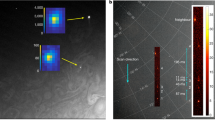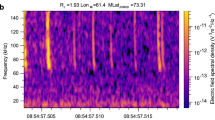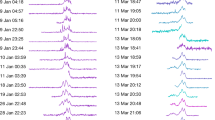Abstract
IN a recent article on the “Scattering of Electromagnetic Waves by Atmospheric Turbulence”1, Dr. E. C. S. Megaw points out that a study of the scintillation of stars is also a study of the average properties of turbulence in the atmosphere. He reviews the rather scanty observational data that are available on the subject. It is in this connexion that some records of stellar scintillation, that have been made recently with a photo-cell at Dunsink Observatory, and which extend the observed upper frequency-limit of the light fluctuations to about 500 cycles a second, may be of interest.
This is a preview of subscription content, access via your institution
Access options
Subscribe to this journal
Receive 51 print issues and online access
$199.00 per year
only $3.90 per issue
Buy this article
- Purchase on Springer Link
- Instant access to full article PDF
Prices may be subject to local taxes which are calculated during checkout
Similar content being viewed by others
References
Nature, 166, 1100 (1950).
Author information
Authors and Affiliations
Rights and permissions
About this article
Cite this article
BUTLER, H. Photo-electric Observations of the Scintillation of Stars. Nature 167, 287–288 (1951). https://doi.org/10.1038/167287a0
Issue Date:
DOI: https://doi.org/10.1038/167287a0
Comments
By submitting a comment you agree to abide by our Terms and Community Guidelines. If you find something abusive or that does not comply with our terms or guidelines please flag it as inappropriate.



